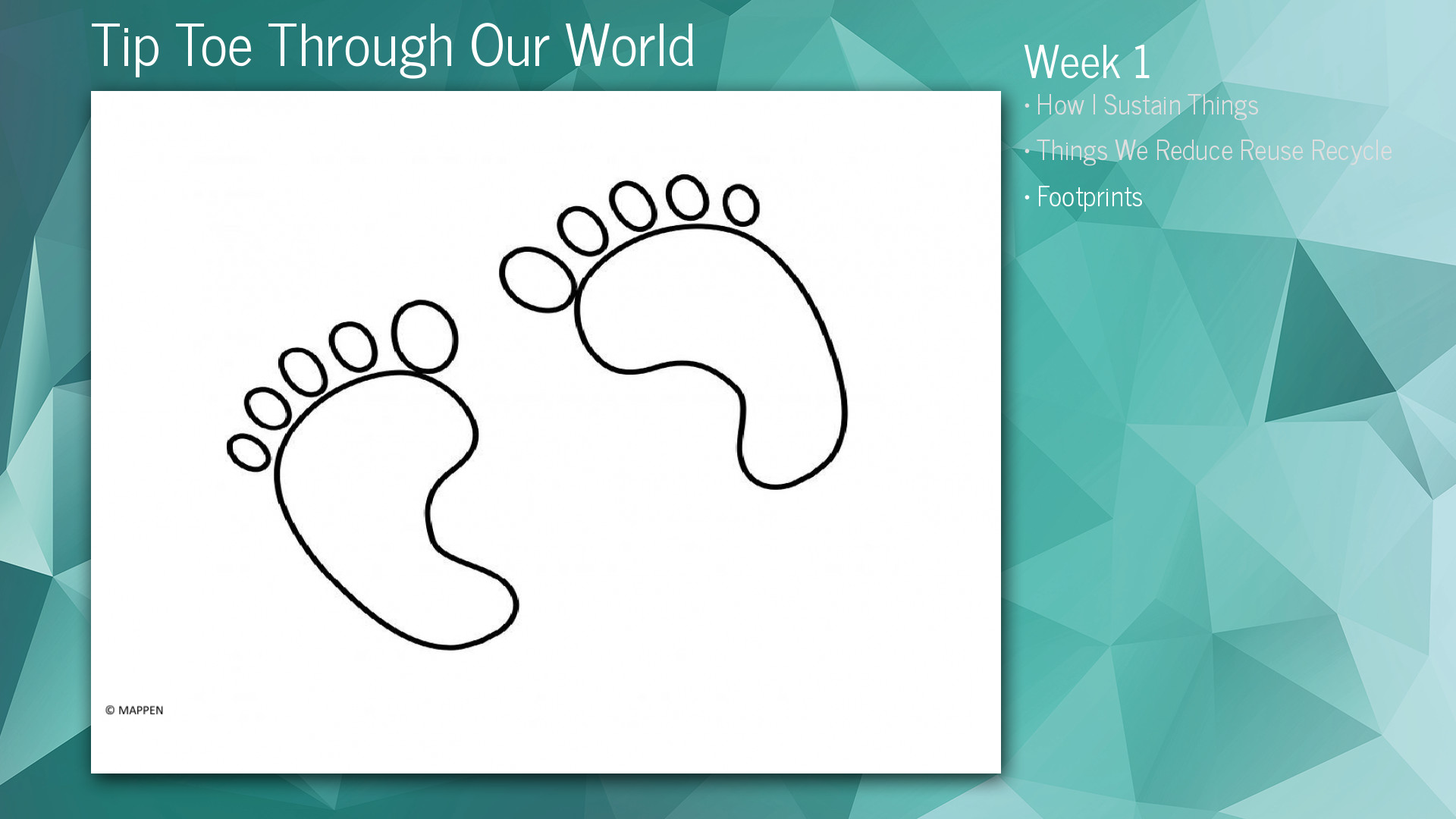Tip Toe Through Our World
Application of Sustainability
Rationale
We all need to take responsibility to look after our environment so that it is preserved for future generations.
Investigation Into
- How to sustain our environment by reducing, reusing and recycling.
- How long things take to decompose.
- The ethics of sustainability.
Essential Questions
- How can we leave a tiny footprint on the environment?
- Do we know what we can reuse, reduce and recycle?
- How can we set goals and influence others to look after our environment?
Future Action
Students will appreciate the importance of looking after the environment. They will be discerning as they dispose of rubbish; understanding the distinction between materials that can be recycled, reused and reduced. Your students will consider the ethics of sustainability as they share our environment.
Pretesting and Familiarisation
The Concept Of Sustainability
Your students will consider how they 'sustain' their health, their friendships, and their environment.
Your students will consider how they 'sustain' their health, their friendships, and their environment.
Pretest
Your students will complete a pretest about reducing, reusing and recycling.
Your students will complete a pretest about reducing, reusing and recycling.
Immersion
Your students will consider the importance of leaving a light footprint on the environment.
Your students will consider the importance of leaving a light footprint on the environment.
Introducing The Unit
Your students will bury rubbish and predict how it might change over time.
Your students will bury rubbish and predict how it might change over time.
Tip Toe Through our World Glossary
Your students will learn some of the words used during this learning sequence.
Your students will learn some of the words used during this learning sequence.
Habit of Mind: Applying Past Knowledge to New Situations
Your students will learn about the Habit of Mind of Applying Past Knowledge To New Situations.
Your students will learn about the Habit of Mind of Applying Past Knowledge To New Situations.
Habit of Mind: Thinking Interdependently
Your students will learn about the Habit of Mind 'Thinking Interdependently'.
Your students will learn about the Habit of Mind 'Thinking Interdependently'.
Learning Opportunities
Decomposition Timeline
Your students will learn about the amount of time different materials take to decompose.
Your students will learn about the amount of time different materials take to decompose.
Recycling Rubbish
Your students will learn about recycling different materials.
Your students will learn about recycling different materials.
Reducing Packaging
Your students will learn about ways to reduce the amount of packaging they accumulate.
Your students will learn about ways to reduce the amount of packaging they accumulate.
Describing Water
Your students will use adjectives to describe water.
Your students will use adjectives to describe water.
Reducing Water Usage
Your students will learn about the effects of drought and the importance of saving water.
Your students will learn about the effects of drought and the importance of saving water.
Growing Plants and Animals
Your students will learn about ways people grow plants and animals to produce fibre.
Your students will learn about ways people grow plants and animals to produce fibre.
Reusing Rubbish
Your students will learn the value of reusing items to make new things as they reuse a container to make a pot for a plant.
Your students will learn the value of reusing items to make new things as they reuse a container to make a pot for a plant.
Lunchbox Data
Your students will analyse the rubbish produced by their lunch.
Your students will analyse the rubbish produced by their lunch.
Making A Gift: Reusing Resources
Your students will reuse objects from home to make a gift.
Your students will reuse objects from home to make a gift.
Making A Gift: Writing A Letter
Your students will write a letter to accompany the gift they made.
Your students will write a letter to accompany the gift they made.
Ethics Of Sustainability
Your students will consider what is right and wrong in relation to sustainable actions.
Your students will consider what is right and wrong in relation to sustainable actions.
Our Environmental Footprint: Preparation
Your students will work in pairs to prepare a presentation about ways to leave a light footprint on the environment.
Your students will work in pairs to prepare a presentation about ways to leave a light footprint on the environment.
Demonstration of Understanding
Our Environmental Footprint: Presentation
Your students will deliver their presentation to pairs of older students.
Your students will deliver their presentation to pairs of older students.
Digging Up Our Rubbish
Your students will dig up the rubbish they buried at the beginning of the learning sequence to identify the extent of decomposition.
Your students will dig up the rubbish they buried at the beginning of the learning sequence to identify the extent of decomposition.
Future Action
Your students will set a sustainable action goal.
Your students will set a sustainable action goal.


